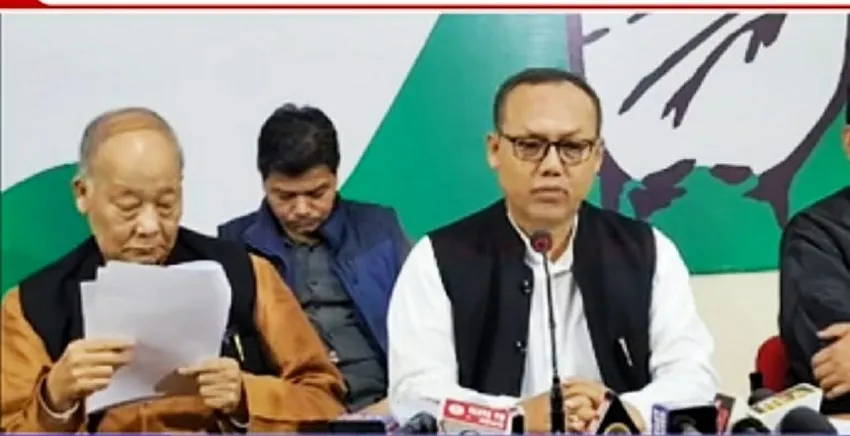Congress President Keisham Meghachandra’s demand for a transparent, equitable, and community-consulted rehabilitation strategy has escalated political pressure on Governor AK Bhalla and the Centre..
By PC Bureau
July 10, 2025: The Manipur government’s new policy for the rehabilitation of Internally Displaced Persons (IDPs), announced last month by Chief Secretary Prashant Kumar Singh, has come under intense fire from across the political and ethnic spectrum. In a rare show of convergence, the Manipur Pradesh Congress Committee (MPCC) and leading civil society organizations (CSOs) from Kuki-Zo community have criticized the policy for being inadequate, exclusionary, and opaque.
On Thursday, Congress state president Keisham Meghachandra submitted a formal memorandum to Governor Ajay Kumar Bhalla at Raj Bhavan, calling for a comprehensive and consultative resettlement plan for the more than 59,000 people displaced by the ethnic violence that erupted on May 3, 2023. The move comes amid rising frustration with the government’s phased plan to shift displaced families to pre-fabricated housing units in locations such as Phubala and Saiton under the Moirang and Kumbi assembly constituencies.
Congress Steps In: Demands Transparent, Inclusive Policy
After visiting several under-construction pre-fab sites in southern Bishnupur earlier this week, Meghachandra called the units “stopgap shelters” that cannot be considered meaningful rehabilitation. “The government’s plan lacks clarity, lacks heart, and most of all, lacks the dignity that displaced people deserve,” he told the media.
The Congress criticized the government’s current approach, describing it as fragmented, opaque, and insensitive to the complex realities of displacement caused by the ethnic violence that erupted in May 2023.
READ: J&K’s ‘Martyrs’ Day’ Sparks Political Firestorm as NC Pushes for Holiday Restoration
In the memorandum, the Congress demanded that the government lay out a clear, publicly accessible roadmap for IDP rehabilitation—one that goes beyond temporary relocation and addresses the long-term needs of over 59,000 displaced individuals. Meghachandra emphasized that the ongoing efforts to resettle IDPs in pre-fabricated units in areas like Phubala and Saiton under the Moirang and Kumbi constituencies cannot be seen as true rehabilitation. These, he said, are stopgap arrangements that do little to rebuild the lives, homes, and futures of families devastated by violence.
The party argued that any serious rehabilitation effort must begin with transparency—making the state’s intentions, plans, and resource allocations public. It stressed the need for inclusive dialogue with all stakeholders, including the displaced themselves, community leaders, civil society organizations, and the political opposition. Meghachandra pointed out that the voices of those most affected by the conflict had been ignored in both policy framing and implementation, deepening the crisis of trust.
Shri Keisham Meghachandra Singh, Hon’ble President of the Manipur Pradesh Congress Committee (MPCC), addressed the media today at Phubala, Bishnupur District, Manipur.
He firmly stated that the Congress Party rejects the so-called three-phase resettlement plan for Internally… pic.twitter.com/1RA9NIPRbv
— INC Manipur (@INCManipur) July 9, 2025
Equity between communities was another central concern. The Congress memorandum warned that any policy perceived to favor one ethnic group over another would only widen existing divides. Rehabilitation, it said, must be humane and fair, and ensure that both Kuki-Zo and Meitei IDPs are treated with dignity and justice. The document further called for a holistic approach—one that incorporates permanent housing at original locations, restoration of livelihoods, educational continuity for children, psychological support for trauma survivors, and measures aimed at rebuilding fractured inter-community relations.
Meghachandra, speaking to reporters after meeting the Governor, said the Congress was not merely criticizing the government but offering constructive alternatives. “This is not about politics; it’s about human lives. Relief camps are overflowing, people are suffering, and yet the state continues to act without a clear vision. We demand accountability, compassion, and competence in handling this humanitarian crisis,” he said.
READ: `Next Dalai Lama Won’t Be Born in China’: Arunachal CM
The Congress leader also warned that the government’s current path could intensify ethnic tensions instead of healing them. He urged the Governor to use his constitutional authority to advise the state to pause and reframe its policy in consultation with all affected communities. The memorandum, in its tone and content, marks a significant escalation in the political discourse surrounding Manipur’s IDP crisis, shifting the debate from technical implementation to fundamental questions of justice, equality, and long-term peace.
The memorandum outlines four major demands:
- Transparency: Public disclosure of the government’s roadmap for IDP rehabilitation, including housing timelines, resource allocation, and security guarantees.
- Inclusive Dialogue: Policy-making should include displaced communities, CSOs, and opposition voices, rather than being decided behind closed doors.
- Long-Term Rehabilitation: Beyond housing, the plan should cover livelihood revival, trauma counselling, and rebuilding inter-community trust.
- Ethnic Sensitivity: Rehabilitation must reflect the ethnic realities of the conflict, ensuring neither Kuki-Zo nor Meitei IDPs are sidelined.
Meghachandra warned that the Congress would mobilize political resistance if the government failed to revisit the policy. “This is not just about homes. It’s about justice, memory, and coexistence,” he said.














